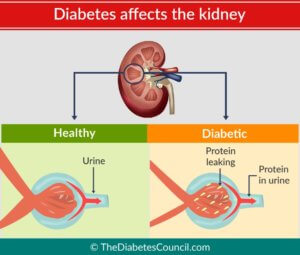Kidney is one of the major excretory organs of the body. It cleans the blood by filtering out extra water and wastes. The kidneys produce hormones (erythropoietin) that help form red blood cells and those which keep the bones strong. The kidneys receive about 1300 ml of blood per minute i.e 26% of cardiac output. Kidneys are the second organs to receive maximum blood flow after liver.
When a patient is diagnosed to have kidney failure, it is usually out of the blue and it comes as a shock to the patient and their relatives. Acute renal failure is dramatic but chronic renal failure is so insidious that patients slip into severe renal dysfunction without much warning. When a patient for the first time hears about kidney failure they go numb with disbelief and go through a phase of denial.
Who is prone to kidney diseases?
- Diabetics 5-20% can develop Kidney Disease.
- Hypertensive patients.
- People with hereditary disorders like polycystic kidney disease or renal hypoplasia.
- Patients with chronic skin and throat infections
- Those who consume over the counter drugs and strong pain killers indiscriminately.
The symptoms of kidney failure include swelling of face and legs, puffiness under the eyes, blood in urine, burning sensation while passing urine and frequent urination, low back ache on either side at night, anaemia, breathlessness, unusual tiredness and weakness, high blood pressure, nausea and vomiting.
Initial screening for kidney disease includes urine analysis for Blood and Albumin, blood test such as blood urea, creatinine and haemoglobin.
If the results are found to be abnormal a nephrologist should be consulted and the tests should be repeated and followed up. A patient detected to have kidney failure should consult a qualified dietician for advice regarding protein, salt, phosphrous, potassium, and fluid intake restriction and reduce the medications that are not necessary. Diet restriction and medications should be followed strictly to slow the progression of the Kidney failure.
The slow and progressive deterioration of the kidneys may lead to a condition known as End Stage Renal Disease (ESRD). Symptoms related to kidney failure usually occur only in late stages of the disease, when kidney function has diminished to less than 25 percent of normal capacity.
Diabetes & Kidney Failure:

Pic courtesy: thediabetescouncil
When our bodies digest the protein we eat, the process creates waste products that build up in the blood. In the kidneys, millions of tiny blood vessels (capillaries) with even tinier holes in them act as filters. As blood flows through the blood vessels, small molecules such as waste products squeeze through the holes and become part of the urine. Useful substances, such as protein and red blood cells, are too big to pass through the holes in the filter so they stay in the blood.
However, when blood sugar levels get too high, it can cause damage to the filters. This puts extra strain on the kidneys and after many years, they start to leak useful protein into the urine. Having small amounts of protein in the urine is called microalbuminuria, having larger amounts is called proteinuria or macroalbuminuria.
Also read: Studying the genetics of cancer
Since one of the big risk factors for diabetes-based ESRD is hypertension, drugs used to lower blood pressure (antihypertensive drugs) can slow the progression of kidney disease significantly. One drug, an angiotensin-converting enzyme (ACE) inhibitor, has proven effective in preventing progression to final stages of kidney diseases. Calcium channel blockers, another class of antihypertensive drugs, also have proven to be useful. Patients with even mild hypertension or persistent microalbuminuria (presence of albumin, a component of protein, in the urine) should consult a physician about the use of antihypertensive medicines. A diet containing reduced amounts of protein may benefit people with renal disease of diabetes. In people with diabetes, excessive protein consumption may be harmful.
As a diabetic, one can avoid further manifestation of kidney disease by checking the blood pressure levels and levels of HbA1c (glycosylated haemoglobin) in the blood periodically, by strictly monitoring blood glucose through insulin injections, medicines, diet and exercise with the advice of the doctor.
The treatment for renal failure basically involves dialysis (Peritoneal and Haemodialysis), or renal transplant.
The problems of newly diagnosed kidney failure patients include acceptance of their condition (which most patients fail to do) and financial problems. Talking to patients who have gone through similar experience and agony is likely to help the patients in accepting the condition and plan out the future course of action.
In case of a kidney transplant, the patient going for such a surgery should be adequately educated to keep a functioning graft. Also the drugs used to prevent rejection of the graft for kidney transplant patients should be used carefully and should not be stopped at any cost.
As in any disease, prevention is better than cure, so also high-risk group patients should carefully monitor the warning signals and seek prompt medical attention. Support of the family members and friends also helps a lot in boosting the morale of the patients and the support group concept can play a key role in helping patients with kidney diseases.
Also read: Women’s Day special: Women’s Wellness
